Overview
- Description
- Correspondence, diary, and documents, belonging to Norman A. Miller (Norbert Müller), and documenting his family's life in Nürnberg, Germany; the effects of Nazi persecution during the 1930s, Miller's immigration to England via a Kindertransport, his service with the British Army during World War II, and his post-war life. The bulk of the collection consists of correspondence Miller received from his family in Nürnberg between 1939 and 1941, describing their experiences, conditions there, and attempt to emigrate. Also included is a pocket diary that Miller began in 1939, postwar correspondence from acquaintances in Germany describing the fate of Miller's family, and copied material related to the history of Miller's family.
A later accretion to this collection included further biographical documents about Miller, including materials from his school years in Germany, such as report cards and notebooks; documents from his military service with the British Army, including documents pertaining his changing his name and his application for British citizenship; and a copy of his birth certificate. This later accretion also included a substantial group of correspondence related to restitution claims filed by Miller and his cousins between 1955 and 1961, including claims for compensation for the loss of liberty suffered by his parents, the expropriation of their business and personal belongings, the loss of opportunity for Miller to obtain an education in Germany due to his expulsion from school due to anti-Semitic laws, expenses incurred by Miller due to his forced emigration; and losses of personal property suffered by Miller’s maternal grandparents and uncle, including the loss of their business through forced sale. A later claim filed in 1974 relates to compensation for the deportation and death of his sister, Susanne.
In addition, donor-provided English translations of the German-language correspondence described above was donated at a later date as well, and added to this collection as a separate series. - Date
-
inclusive:
1937-2015
- Credit Line
- United States Holocaust Memorial Museum Collection, Gift of Norman A. Miller
- Collection Creator
- Norman A. Miller
- Biography
-
Norbert Müller (later Norman A. Miller) was born on June 2, 1924, in Tann in der Rhön, Germany, to Sebald and Laura Jüngster Müller. Sebald was born on April 17, 1892, in Marisfeld, Germany, to Nathan and Bertha Müller and had 2 siblings, Max and Elsa. He was a Jewish grade school teacher, musician, and town shochet, ritual animal slaughterer. Laura was born on October 17, 1898, in Tann, to Leopold and Clara Jacobs Jüngster and had a brother and 2 sisters, Bertha and Dina. Her family ran a shoemaker’s shop and had been in the town since the 1700s. On July 7, 1922, Sebald married Laura. On October 11, 1925, Norbert’s younger sister, Susanne (Suse) was born. Norbert’s family was Orthodox, and very active in the town’s close-knit Jewish community. In 1930, Norbert’s family moved when Sebald accepted a position to teach at a Jewish primary school associated with the large synagogue in Nuremberg. Norbert attended the synagogue school where his father taught.
In 1933, the Nazi regime came to power and enacted policies that persecuted the Jewish population. These stripped many Jewish professionals of their right to work. Sebald’s job was not directly impacted because he worked for the Jewish congregation, which had to teach more children as Jewish students were forced out of public schools. Norbert attended a Jewish high school in Fürth. In 1936, Norbert’s grandfather Leopold Jüngster died and his grandmother Clara moved in with one of her daughters, Norman’s aunts. As the restrictions increased, the Müllers began making plans to immigrate. Everyone in the family got passports and the family registered for American immigration quota numbers. Norbert’s parents registered him and Suse for the Kindertransport [Children’s Transport] a rescue mission to save Jewish children managed by Bloomsbury House, a group of British Jewish aid societies. Everyone began learning English and possibly useful skills for immigration: Sebald learned new instruments, Laura began making fancy candies, and Norbert focused on welding, along with his friend Lou Hochster. His grandmother Clara came to live with the family after her daughters’ families immigrated: Bertha’s to the United States and Dina’s to England. On November 9, 1938, during the Kristallnacht pogrom, German men charged into the Müller’s apartment and began hacking at the furniture and instruments with an axe, leaving only a few salvageable items. On April 30, 1939, Jews lost their rights as legal tenants and the Müllers were forced to move to a designated Jewish building where they shared an apartment with an elderly couple, Samuel and Esther Munk.
In August 1939, Bloomsbury House approved Norbert’s travel permit, but provided no travel details. At the end of the month, Lou Hochster and his family invited Norbert to join them when they immigrated to England. Norbert agreed, and Sebald accompanied him and the family on the train to Würzburg, where they were scheduled to catch an express train to Holland, though Norbert did not have the correct papers to go there. They missed the connection and ended up in Cologne, where Sebald saw a Kindertransport group was assembling. He asked if Norbert could join them and they said yes, as long as he had the correct papers. There was a British consulate in Cologne, but when they arrived it was closed. Sebald snuck into the office and added the correct stamp and a note referencing the transport permit letter to Norbert’s passport. Norbert was able to join the Kindertransport leaving for England on August 29, 1939. He reached London, England a few days later and was sent to a rabbi related to the Munks.
On September 3, Great Britain and France declared war against Germany in response to the September 1st invasion of Poland. Rabbi Munk sent Norbert to a home for refugee boys in Croydon, and then he lived with another rabbi in East London. Norbert’s welding skills allowed him to work in several machine shops. He was able to write to his family regularly, though he had to send his letters through his mother’s uncle Moritz Jacobs in Belgium because of the war. After Germany invaded Belgium in May 1940, he sent a few letters through his Aunt Bertha in the US. When he turned 16, the British declared that Norbert was a “friendly alien of enemy origin.” His parents were still trying to leave Germany, but Grandma Clara had a high quota number and his father was very worried about having to leave her behind. The last letter Norbert received from his family was dated May 1941. Norbert survived many air raids and had to put out several bomb-related fires at a machine shop. In 1944, twenty year old Norbert enlisted in the army and changed his name to Norman Albert Miller, at the army’s suggestion, to sound less German. In January 1945, Norman, an infantryman with the 6th Battalion, 158th Brigade, 53rd Division of the Royal Welch (Welsh) Fusiliers attached to the XXX Corps, was deployed to Belgium. Due to his fluency in German, he was soon sent to the Company headquarters to perform intelligence work.
When Germany surrendered on May 7, 1945, his battalion was in Hamburg, Germany, on occupational duty. While performing routine traffic control on the Elbe River Bridge that day, Norman recognized Arthur Seyss-Inquart, who had been Reich Commissar in the Netherlands during the German occupation, and secured his arrest. He was later tried and found guilty in the International Military Tribunal in Nuremberg, and executed. Shortly after this incident, Norman asked to be transferred to the Intelligence Corps in order to report suspicious behavior, and was stationed in Bad Pyrmont. In 1946, Norman received a letter from Albert Stimmelstiel, a young Jewish man from Nuremberg, detailing the fate of Norman’s family. On November 27, 1941, his parents, Sebald and Laura, his sister, Suse, and grandmother, Clara, had been rounded up by the Gestapo and deported to Riga, Latvia, where they were interned in the nearby Jungfernhof concentration camp. After contracting typhus, they were killed in a mass execution along with other elderly and ill people on March 26, 1942. In July 1947, Sergeant Norman Miller became a British citizen. Following demobilization, he returned to London. In April 1948, he immigrated to Toronto, Canada, with a friend. In September 1949, Norman moved to the US to live with his Aunt Bertha’s family in New York City. In 1951, he married Ingeborg Sommer (b.1930), a Jewish émigré from Baden, Germany, that had immigrated to the US with her parents in 1937. The couple had two sons. Norman worked in the tool and die field making injection molds to make plastic goods. In 1955, Norman became an American citizen.
Physical Details
- Genre/Form
- Correspondence. Diary.
- Extent
-
2 boxes
- System of Arrangement
- The Norman A. Miller papers are arranged in large chronological order for the correspondence, and for those files and the remaining materials, in a numbered sequence of documents established by the donor.
Rights & Restrictions
- Conditions on Access
- There are no known restrictions on access to this material.
- Conditions on Use
- Copyright to the English translations of these letters, as well as the rights to Miller's diary and other materials created by him or other family members has been retained by the donor. Other material in this collection may be protected by copyright and/or related rights. You do not require further permission from the Museum to use this material. The user is solely responsible for making a determination as to if and how the material may be used.
- Copyright Holder
- Miller, Norman Albert
Keywords & Subjects
Administrative Notes
- Holder of Originals
-
United States Holocaust Memorial Museum
- Legal Status
- Permanent Collection
- Provenance
- Norman A. Miller donated the Norman A. Miller family papers to the United States Holocaust Memorial Museum in 2016.
- Record last modified:
- 2023-08-25 08:48:31
- This page:
- https://collections.ushmm.org/search/catalog/irn537182?rsc=29646&cv=0&x=1298&y=1790&z=1.4e-4
Additional Resources
Download & Licensing
- See Rights and Restrictions
- Terms of Use
- This record is digitized but cannot be downloaded online.
In-Person Research
- Available for Research
- Plan a Research Visit
-
Request in Shapell Center Reading Room
Bowie, MD
Contact Us
Also in Norman A. Miller family collection
The collection consists of religious and military artifacts, correspondence, a diary, documents, photographs, and publications relating to the experiences of Norman A. Miller and his family before and during the Holocaust in Nuremberg, Germany, and in Great Britain where Miller was a Kindertransport refugee and later a World War II soldier, as well as his postwar life in England, Canada, and the United States.
Date: 1832-2015
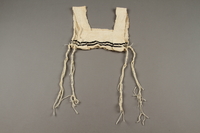
Tallit katan brought to England by a British soldier and Kindertransport refugee
Object
Tallit katan belonging to Norbert Müller (later Norman Miller), a 15 year old German Jewish refugee who came to London, England in September 1939. A tallit katan is a religious garment worn by Jewish men and boys with their daily dress. On November 9, 1938, during Kristallnacht in Nuremberg, Germany, the apartment Norbert shared with his parents, Sebald and Laura, younger sister, Suse, and grandmother, Clara Jüngster, was ransacked by local men with axes. In late August 1939, Norbert, managed to leave Germany for London, with a Kindertransport [Children's Transport] two days prior to the start of World War II. Norbert was able to exchange letters with his family until communications ceased in May 1941. In 1944, Norbert enlisted in the British army and changed his name. In early 1945, his unit was deployed to Belgium. When Germany surrendered on May 7, his unit was serving occupational duty in Hamburg. After the war, Norman learned that his family had been deported in November 1941, to Riga, Latvia and interned in Jungfernhof concentration camp where they fell ill with typhus and were killed in a mass execution on March 26, 1942. Norman eventually immigrated to the United States and became a citizen in 1955. He married a fellow German, Jewish emigrant, Ingeborg Sommer and they had two sons.
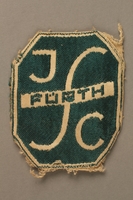
Embroidered Fürth patch saved by a British soldier and Kindertransport refugee
Object
Embroidered, blue green patch belonging to Norbert Müller (later Norman Miller) a 15 year old German Jewish refugee who came to London, England in September 1939. The patch is likely related to the large Jewish High School he attended in Fürth, Germany. He lived in Nuremberg, but was required to take a streetcar to school in Fürth once Jewish children were banned from German public schools. On November 9, 1938, during Kristallnacht in Nuremberg, Germany, the apartment Norbert shared with his parents, Sebald and Laura, younger sister, Suse, and grandmother, Clara Jüngster, was ransacked by local men with axes. In late August 1939, Norbert, managed to leave Germany for London, with a Kindertransport [Children's Transport] two days prior to the start of World War II. Norbert was able to exchange letters with his family until communications ceased in May 1941. In 1944, Norbert enlisted in the British army and changed his name. In early 1945, his unit was deployed to Belgium. When Germany surrendered on May 7, his unit was serving occupational duty in Hamburg. After the war, Norman learned that his family had been deported in November 1941, to Riga, Latvia and interned in Jungfernhof concentration camp where they fell ill with typhus and were killed in a mass execution on March 26, 1942. Norman eventually immigrated to the United States and became a citizen in 1955. He married a fellow German, Jewish emigrant, Ingeborg Sommer and they had two sons.
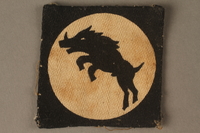
XXX Corps patch worn by a British soldier and Kindertransport refugee
Object
British Army XXX Corps patch worn by Norman Miller (previously Norbert Müller), a German Jewish refugee, during his service in the British Army from 1944 to 1947. The XXX Corps was attached to the 21st Army Group and participated in D-Day landings at Normandy and the invasion of Europe, known as Operation Overlord. On November 9, 1938, during Kristallnacht in Nuremberg, Germany, the apartment Norbert shared with his parents, Sebald and Laura, younger sister, Suse, and grandmother, Clara Jüngster, was ransacked by local men with axes. In late August 1939, Norbert, managed to leave Germany for London, with a Kindertransport [Children's Transport] two days prior to the start of World War II. Norbert was able to exchange letters with his family until communications ceased in May 1941. In 1944, Norbert enlisted in the British army and changed his name. In early 1945, his unit was deployed to Belgium. When Germany surrendered on May 7, his unit was serving occupational duty in Hamburg. After the war, Norman learned that his family had been deported in November 1941, to Riga, Latvia and interned in Jungfernhof concentration camp where they fell ill with typhus and were killed in a mass execution on March 26, 1942. Norman eventually immigrated to the United States and became a citizen in 1955. He married a fellow German, Jewish emigrant, Ingeborg Sommer and they had two sons.
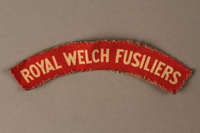
Royal Welch Fusiliers shoulder patch worn by a British soldier and Kindertransport refugee
Object
Royal Welch Fusiliers shoulder patch worn by Norman Miller (previously Norbert Müller), a German Jewish refugee, during his service in the British Army from 1944 to 1947. On November 9, 1938, during Kristallnacht in Nuremberg, Germany, the apartment Norbert shared with his parents, Sebald and Laura, younger sister, Suse, and grandmother, Clara Jüngster, was ransacked by local men with axes. In late August 1939, Norbert, managed to leave Germany for London, with a Kindertransport [Children's Transport] two days prior to the start of World War II. Norbert was able to exchange letters with his family until communications ceased in May 1941. In 1944, Norbert enlisted in the British army and changed his name. In early 1945, his unit was deployed to Belgium. The fusiliers, named for the flintlock muskets they were originally equipped with, gained the title of “The Prince of Wales’s Own Regiment of Fusiliers” in the 1700s. The designation was later shortened to the Royal Welch Fusiliers, utilizing the original spelling of Welsh. When Germany surrendered on May 7, his unit was serving occupational duty in Hamburg. After the war, Norman learned that his family had been deported in November 1941, to Riga, Latvia and interned in Jungfernhof concentration camp where they fell ill with typhus and were killed in a mass execution on March 26, 1942. Norman eventually immigrated to the United States and became a citizen in 1955. He married a fellow German, Jewish emigrant, Ingeborg Sommer and they had two sons.
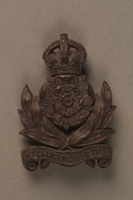
Intelligence Corps cap badge worn by a British soldier and Kindertransport refugee
Object
Intelligence Corps cap badge worn by Norman Miller (previously Norbert Müller), a German Jewish refugee, during his service in the British Army from 1944 to 1947. On November 9, 1938, during Kristallnacht in Nuremberg, Germany, the apartment Norbert shared with his parents, Sebald and Laura, younger sister, Suse, and grandmother, Clara Jüngster, was ransacked by local men with axes. In late August 1939, Norbert, managed to leave Germany for London, with a Kindertransport [Children's Transport] two days prior to the start of World War II. Norbert was able to exchange letters with his family until communications ceased in May 1941. In 1944, Norbert enlisted in the British army and changed his name. In early 1945, his unit was deployed to Belgium. When Germany surrendered on May 7, his unit was serving occupational duty in Hamburg. Later that year, Norman joined the Intelligence Corps, which had been formed in July 1940, and was represented by a crowned rose insignia. The rose symbolized the Latin phrase “sub rosa,” which was derived from an earlier Roman practice that placed a rose on a door when confidential matters were being discussed within. After the war, Norman learned that his family had been deported in November 1941, to Riga, Latvia and interned in Jungfernhof concentration camp where they fell ill with typhus and were killed in a mass execution on March 26, 1942. Norman eventually immigrated to the United States and became a citizen in 1955. He married a fellow German, Jewish emigrant, Ingeborg Sommer and they had two sons.
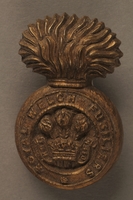
Royal Welch Fusiliers economy issue cap badge worn by a British soldier and Kindertransport refugee
Object
Royal Welch Fusiliers economy issue badge worn by Norman Miller (previously Norbert Müller), a German Jewish refugee, during his service in the British Army from 1944 to 1947. As World War II progressed, a shortage of brass, considered a strategic metal, led the British army to replace traditional brass cap badges with plastic economy ones. This change resulted in the conservation of a large quantity of brass for critical wartime use, such as munitions. On November 9, 1938, during Kristallnacht in Nuremberg, Germany, the apartment Norbert shared with his parents, Sebald and Laura, younger sister, Suse, and grandmother, Clara Jüngster, was ransacked by local men with axes. In late August 1939, Norbert, managed to leave Germany for London, with a Kindertransport [Children's Transport] two days prior to the start of World War II. Norbert was able to exchange letters with his family until communications ceased in May 1941. In 1944, Norbert enlisted in the British army and changed his name. In early 1945, his unit was deployed to Belgium. The fusiliers, named for the flintlock muskets they carried, gained the title of “The Prince of Wales’s Own Regiment of Fusiliers” in the 1700s. The designation was shortened to the Royal Welch Fusiliers, utilizing the original spelling of Welsh. In the 1800s, the fused or flaming grenade bearing the Prince’s badge became the unit’s identifying insignia. When Germany surrendered on May 7, his unit was in Hamburg. After the war, Norman learned that his family had been deported in November 1941, to Riga, Latvia and interned in Jungfernhof concentration camp where they fell ill with typhus and were killed in a mass execution on March 26, 1942. Norman eventually immigrated to the United States and became a citizen in 1955. He married a fellow German, Jewish emigrant, Ingeborg Sommer and they had two sons.
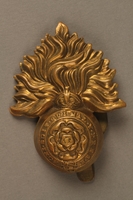
Royal Fusiliers cap badge worn by a British soldier and Kindertransport refugee
Object
Royal Fusiliers cap badge worn by Norman Miller (previously Norbert Müller), a German Jewish refugee, during his service in the British Army from 1944 to 1947. On November 9, 1938, during Kristallnacht in Nuremberg, Germany, the apartment Norbert shared with his parents, Sebald and Laura, younger sister, Suse, and grandmother, Clara Jüngster, was ransacked by local men with axes. In late August 1939, Norbert, managed to leave Germany for London, with a Kindertransport [Children's Transport] two days prior to the start of World War II. Norbert was able to exchange letters with his family until communications ceased in May 1941. In 1944, Norbert enlisted in the British army and changed his name. In early 1945, his unit was deployed to Belgium. The Royal Fusiliers, named for the flintlock muskets they were originally equipped with, were designated the City of London Regiment in the 1800s. The unit insignia was a fused or flaming grenade bearing a Tudor rose, Victorian crown, and a garter with the Order of the Garter motto. When Germany surrendered on May 7, his unit was serving occupational duty in Hamburg. After the war, Norman learned that his family had been deported in November 1941, to Riga, Latvia and interned in Jungfernhof concentration camp where they fell ill with typhus and were killed in a mass execution on March 26, 1942. Norman eventually immigrated to the United States and became a citizen in 1955. He married a fellow German, Jewish emigrant, Ingeborg Sommer and they had two sons.
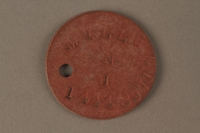
Circular identification tag worn by a British soldier and Kindertransport refugee
Object
Circular, compressed asbestos fiber dog tag worn by Norman Miller (previously Norbert Müller), a German Jewish refugee, during his service in the British Army from 1944 to 1947. Each soldier was issued 2 tags, hexagonal green and circular red, stamped with identical identifying information, including religion. The green tag was worn on a long neck cord with the red one attached to it on a short cord that could easily be removed without disturbing the other tag when a death had to be reported. On November 9, 1938, during Kristallnacht in Nuremberg, Germany, the apartment Norbert shared with his parents, Sebald and Laura, younger sister, Suse, and grandmother, Clara Jüngster, was ransacked by local men with axes. In late August 1939, Norbert, managed to leave Germany for London, with a Kindertransport [Children's Transport] two days prior to the start of World War II. Norbert was able to exchange letters with his family until communications ceased in May 1941. In 1944, Norbert enlisted in the British army and changed his name. In early 1945, his unit was deployed to Belgium. When Germany surrendered on May 7, his unit was serving occupational duty in Hamburg. After the war, Norman learned that his family had been deported in November 1941, to Riga, Latvia and interned in Jungfernhof concentration camp where they fell ill with typhus and were killed in a mass execution on March 26, 1942. Norman eventually immigrated to the United States and became a citizen in 1955. He married a fellow German, Jewish emigrant, Ingeborg Sommer and they had two sons.
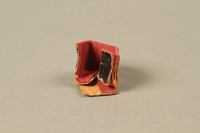
Single tefillin with covers and pouch owned by a British soldier and Kindertransport refugee
Object
Single tefillin with covers and a navy blue velvet storage pouch owned by Norbert Müller (later Norman Miller) a 15 year old German Jewish refugee who came to London, England in September 1939. Tefillin are small boxes containing prayers attached to leather straps and worn on the arm and the head by Orthodox Jewish males during morning prayers. On November 9, 1938, during Kristallnacht in Nuremberg, Germany, the apartment Norbert shared with his parents, Sebald and Laura, younger sister, Suse, and grandmother, Clara Jüngster, was ransacked by local men with axes. In late August 1939, Norbert, managed to leave Germany for London, with a Kindertransport [Children's Transport] two days prior to the start of World War II. Norbert was able to exchange letters with his family until communications ceased in May 1941. In 1944, Norbert enlisted in the British army and changed his name. In early 1945, his unit was deployed to Belgium. When Germany surrendered on May 7, his unit was serving occupational duty in Hamburg. After the war, Norman learned that his family had been deported in November 1941, to Riga, Latvia and interned in Jungfernhof concentration camp where they fell ill with typhus and were killed in a mass execution on March 26, 1942. Norman eventually immigrated to the United States and became a citizen in 1955. He married a fellow German, Jewish emigrant, Ingeborg Sommer and they had two sons.
Bible and Talmud book returned to a family after being confiscated during the war
Object
The Bibel-und Talmudschatz is one of five books from the personal collection of Sebald Müller that were confiscated by the Nazi regime and added to Julius Streicher's Library of Judaica in the 1930s. After the war, the books were placed in the collection of the Stadt-Bibliothek Nuremberg [Nuremberg City Library], which returned them to Sebald’s son, Norman Miller (previously Norbert Müller) in 2011. The book is inscribed by Sebald to his mother, Bertha, on the occasion of her husband, and his father, Nathan’s death. On November 9, 1938, during Kristallnacht in Nuremberg, Germany, the apartment Sebald shared with his wife, Laura, their children, Norbert and Suse, and mother-in-law, Clara Jüngster, was ransacked by local men with axes. In late August 1939, Sebald, managed to get Norbert out of Germany on a Kindertransport [Children's Transport] to London two days prior to the start of World War II. Sebald and the other family members were able to exchange letters with Norbert until communications ceased in May 1941. In November 1941, Sebald, Laura, Suse and Clara were deported to Riga, Latvia and interned in Jungfernhof concentration camp where they fell ill with typhus and were killed in a mass execution on March 26, 1942. In 1944, Norbert enlisted in the British army and changed his name. While serving on occupational duty in Germany after the war, Norman learned his family’s fate from a man that was being held in Jungfernhof with them. Norman eventually immigrated to the United States and became a citizen in 1955. He married a fellow German, Jewish emigrant, Ingeborg Sommer, and they had two sons.
Book of Jewish folksongs returned to a family after being confiscated during the war
Object
The Jüdische Volkslieder: für eine Singstimme mit Klavier is one of five books from the personal collection of Sebald Müller that were confiscated by the Nazi regime and added to Julius Streicher's Library of Judaica in the 1930s. After the war, the books were placed in the collection of the Stadt-Bibliothek Nuremberg [Nuremberg City Library], which returned them to Sebald’s son, Norman Miller (previously Norbert Müller) in 2011. On November 9, 1938, during Kristallnacht in Nuremberg, Germany, the apartment Sebald shared with his wife, Laura, their children, Norbert and Suse, and mother-in-law, Clara Jüngster, was ransacked by local men with axes. In late August 1939, Sebald, managed to get Norbert out of Germany on a Kindertransport [Children's Transport] to London two days prior to the start of World War II. Sebald and the other family members were able to exchange letters with Norbert until communications ceased in May 1941. In November 1941, Sebald, Laura, Suse and Clara were deported to Riga, Latvia and interned in Jungfernhof concentration camp where they fell ill with typhus and were killed in a mass execution on March 26, 1942. In 1944, Norbert enlisted in the British army and changed his name. While serving on occupational duty in Germany after the war, Norman learned his family’s fate from a man that was being held in Jungfernhof with them. Norman eventually immigrated to the United States and became a citizen in 1955. He married a fellow German, Jewish emigrant, Ingeborg Sommer, and they had two sons.
Catalog of the works of Jewish composers returned to a family after being confiscated during the war
Object
The Der jüdische Musikalien-Katalog is one of five books from the personal collection of Sebald Müller that were confiscated by the Nazi regime and added to Julius Streicher's Library of Judaica in the 1930s. After the war, the books were placed in the collection of the Stadt-Bibliothek Nuremberg [Nuremberg City Library], which returned them to Sebald’s son, Norman Miller (previously Norbert Müller) in 2011. The book is inscribed Müller. On November 9, 1938, during Kristallnacht in Nuremberg, Germany, the apartment Sebald shared with his wife, Laura, their children, Norbert and Suse, and mother-in-law, Clara Jüngster, was ransacked by local men with axes. In late August 1939, Sebald, managed to get Norbert out of Germany on a Kindertransport [Children's Transport] to London two days prior to the start of World War II. Sebald and the other family members were able to exchange letters with Norbert until communications ceased in May 1941. In November 1941, Sebald, Laura, Suse and Clara were deported to Riga, Latvia and interned in Jungfernhof concentration camp where they fell ill with typhus and were killed in a mass execution on March 26, 1942. In 1944, Norbert enlisted in the British army and changed his name. While serving on occupational duty in Germany after the war, Norman learned his family’s fate from a man that was being held in Jungfernhof with them. Norman eventually immigrated to the United States and became a citizen in 1955. He married a fellow German, Jewish emigrant, Ingeborg Sommer, and they had two sons.
Jewish religious song book returned to a family after being confiscated during the war
Object
The Song of Solomon, Chasonus, and sheet music are among five books from the personal collection of Sebald Müller that were confiscated by the Nazi regime and added to Julius Streicher's Library of Judaica in the 1930s. After the war, the books were placed in the collection of the Stadt-Bibliothek Nuremberg [Nuremberg City Library], which returned them to Sebald’s son, Norman Miller (previously Norbert Müller) in 2011. The book is inscribed Müller and Jacob Heinfeldt. On November 9, 1938, during Kristallnacht in Nuremberg, Germany, the apartment Sebald shared with his wife, Laura, their children, Norbert and Suse, and mother-in-law, Clara Jüngster, was ransacked by local men with axes. In late August 1939, Sebald, managed to get Norbert out of Germany on a Kindertransport [Children's Transport] to London two days prior to the start of World War II. Sebald and the other family members were able to exchange letters with Norbert until communications ceased in May 1941. In November 1941, Sebald, Laura, Suse and Clara were deported to Riga, Latvia and interned in Jungfernhof concentration camp where they fell ill with typhus and were killed in a mass execution on March 26, 1942. In 1944, Norbert enlisted in the British army and changed his name. While serving on occupational duty in Germany after the war, Norman learned his family’s fate from a man that was being held in Jungfernhof with them. Norman eventually immigrated to the United States and became a citizen in 1955. He married a fellow German, Jewish emigrant, Ingeborg Sommer, and they had two sons.
Prayer book for Passover days 1 and 2 owned by a British soldier and German Jewish emigre
Object
The Baal t'fillah oder Der practische Vorbeter is one of five books from the personal collection of Sebald Müller that were confiscated by the Nazi regime and added to Julius Streicher's Library of Judaica in the 1930s. After the war, the books were placed in the collection of the Stadt-Bibliothek Nuremberg [Nuremberg City Library], which returned them to Sebald’s son, Norman Miller (previously Norbert Müller) in 2011. On November 9, 1938, during Kristallnacht in Nuremberg, Germany, the apartment Sebald shared with his wife, Laura, their children, Norbert and Suse, and mother-in-law, Clara Jüngster, was ransacked by local men with axes. In late August 1939, Sebald, managed to get Norbert out of Germany on a Kindertransport [Children's Transport] to London two days prior to the start of World War II. Sebald and the other family members were able to exchange letters with Norbert until communications ceased in May 1941. In November 1941, Sebald, Laura, Suse and Clara were deported to Riga, Latvia and interned in Jungfernhof concentration camp where they fell ill with typhus and were killed in a mass execution on March 26, 1942. In 1944, Norbert enlisted in the British army and changed his name. While serving on occupational duty in Germany after the war, Norman learned his family’s fate from a man that was being held in Jungfernhof with them. Norman eventually immigrated to the United States and became a citizen in 1955. He married a fellow German, Jewish emigrant, Ingeborg Sommer, and they had two sons.
Book
Object
1832 German translation of a Passover prayer book recorded in Hebrew owned by Norbert Müller (later Norman Miller), a 15 year old German Jewish refugee who came to London, England in September 1939. The front cover is inscribed by Norbert’s maternal great grandmother, Sara Jacobs. On November 9, 1938, during Kristallnacht in Nuremberg, Germany, the apartment Norbert shared with his parents, Sebald and Laura, younger sister, Suse, and grandmother, Clara Jüngster, was ransacked by local men with axes. In late August 1939, Norbert, managed to leave Germany for London, with a Kindertransport [Children's Transport] two days prior to the start of World War II. Norbert was able to exchange letters with his family until communications ceased in May 1941. In 1944, Norbert enlisted in the British army and changed his name. In early 1945, his unit was deployed to Belgium. When Germany surrendered on May 7, his unit was serving occupational duty in Hamburg. After the war, Norman learned that his family had been deported in November 1941, to Riga, Latvia and interned in Jungfernhof concentration camp where they fell ill with typhus and were killed in a mass execution on March 26, 1942. Norman eventually immigrated to the United States and became a citizen in 1955. He married a fellow German, Jewish emigrant, Ingeborg Sommer and they had two sons.
Wedding edition of Mein Kampf with slipcase confiscated by a British soldier and German Jewish emigre
Object
Wedding presentation edition of Hitler's Mein Kampf with slipcase acquired by Norman Miller (previously Norbert Müller), a German Jewish refugee, during his service in the British Army from 1944 to 1947. On November 9, 1938, during Kristallnacht in Nuremberg, Germany, the apartment Norbert shared with his parents, Sebald and Laura, younger sister, Suse, and grandmother, Clara Jüngster, was ransacked by local men with axes. In late August 1939, Norbert, managed to leave Germany for London, with a Kindertransport [Children's Transport] two days prior to the start of World War II. Norbert was able to exchange letters with his family until communications ceased in May 1941. In 1944, Norbert enlisted in the British army and changed his name. In early 1945, his unit was deployed to Belgium. When Germany surrendered on May 7, his unit was serving occupational duty in Hamburg. He confiscated the book from German civilians in 1946 while stationed in Lower Saxony as an Intelligence Corps officer in the Allied occupation force. After the war, Norman learned that his family had been deported in November 1941, to Riga, Latvia and interned in Jungfernhof concentration camp where they fell ill with typhus and were killed in a mass execution on March 26, 1942. Norman eventually immigrated to the United States and became a citizen in 1955. He married a fellow German, Jewish emigrant, Ingeborg Sommer and they had two sons.



